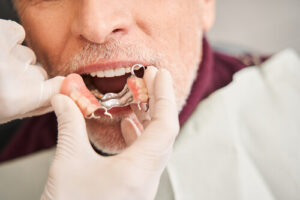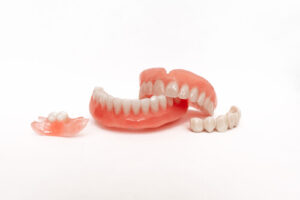Can You Sleep with Dentures? Here’s What You Should Know
Wearing dentures has helped millions of people regain their smile, eat more comfortably, and improve speech. But if you’re new to them or considering getting a set, one common question may be on your mind: Can you sleep with dentures?
The short answer is that while it is generally safe on rare occasions, most dental professionals do not recommend sleeping with dentures on a nightly basis. Let’s explore why and what happens when you wear dentures overnight. For expert advice on denture care and maintenance, visit MyHM Dentist Kellyville.
Why Some People Sleep with Dentures
Many denture wearers choose to keep their dentures in while sleeping due to convenience, habit, or personal comfort. People may not want their partner to see them without teeth, or they may find removing dentures at night uncomfortable or unnecessary. For new users, especially those with immediate dentures, it can feel strange to take them out.
However, sleeping with dentures regularly may come with risks that can affect your oral health, gum tissue, and even general well-being.
What Happens When You Wear Dentures Overnight?
Dentures are designed to replace missing teeth, but your mouth needs a break from them. If you wear dentures overnight without giving your oral tissues a rest, you may face several issues over time.
 1. Increased Risk of Oral Infections
1. Increased Risk of Oral Infections
Wearing dentures around the clock can lead to harmful effects such as:
- Bacterial buildup and fungal infections like denture stomatitis
- Growth of harmful microorganisms
- Inflammation or redness in the gums
According to dental research, constantly covering your soft tissues limits oxygen exposure and creates a warm, moist environment, ideal for fungal overgrowth. This increases the chance of gum inflammation, dry mouth, and even infections.
2. Gum and Bone Health Complications
Constant pressure on your gums and jawbone can:
- Accelerate bone loss
- Cause gum irritation
- Lead to poorly fitting or ill-fitting dentures
- Raise the risk of tooth loss in those wearing partial dentures
Sleeping without dentures reduces gum irritation and improves blood circulation in the oral tissues, which helps keep your gums healthy and comfortable.
3. Risk of Serious Health Issues
Sleeping with dentures has been linked to more severe problems in older adults. Studies show that elderly denture wearers who leave their false teeth in at night have an increased risk of developing pneumonia, especially due to bacterial buildup from unclean dentures. This is particularly concerning for those with other conditions like sleep apnea or weakened immune systems.
What About Partial Dentures?
Just like full dentures, wearing partial dentures overnight is not recommended. These dental appliances still rest on gums and natural teeth, and can trap food particles, encourage plaque formation, and irritate your mouth if left in too long. Allowing your oral tissues to rest each night is key to maintaining long-term oral health.
When Is It Okay to Sleep with Dentures?
In some situations, dental professionals may advise you to sleep with dentures temporarily:
- Immediate dentures may be worn overnight for a short period after extractions to protect surgical sites and support healing
- During specific treatment plans directed by your dental team
However, this should only be done under the supervision of a dental professional and not as a long-term habit.
How to Care for Your Dentures at Night
Maintaining your denture care routine is just as important as brushing your natural teeth. Here’s how you can keep your dentures safe and your oral hygiene in check while you sleep:
Remove Your Dentures
Always take your dentures out before bed unless otherwise instructed. This allows your oral tissues to breathe and recover from daily use.
Gently Brush Your Dentures
Use a soft bristled brush or soft toothbrush and a non abrasive denture cleaner to gently scrub your dentures. Never use regular toothpaste, as it can be too abrasive and cause damage.
Soak in a Denture Cleaning Solution
Overnight soaking in a denture cleanser or denture cleaning solution helps remove debris and prevent harmful bacteria from building up. This also keeps them from drying out or warping.
Clean Your Mouth Too
After removing dentures, gently brush your gums, tongue, and the roof of your mouth to prevent plaque buildup and keep your oral hygiene strong.
Store Dentures Properly
Keep your dentures in a clean, covered container with fresh water or a cleansing solution. This ensures they stay moist and maintain their shape, promoting better denture longevity.
Why Removing Dentures Matters for Long-Term Health
Taking out your dentures nightly has several long-term benefits, including:
- Better gum health and reduced irritation
- Less risk of tooth decay, particularly for those wearing partial dentures
- Lower chance of oral infections or oral health problems
- Protection against denture stomatitis and gum disease
- Prolonged denture longevity
By maintaining a nightly denture care routine and following your dental professional’s advice, you can enjoy more comfort and fewer issues in the future.
What If You Accidentally Sleep with Dentures?
If you forget to take them out once in a while, don’t worry too much. Just make sure to clean them thoroughly the next morning and avoid making it a nightly habit. Continuous overnight wear is where the risks tend to build.
When to Call Your Dental Team
 You should consult your dental team if you notice:
You should consult your dental team if you notice:
- Persistent gum irritation or soreness
- Signs of denture stomatitis such as redness or white patches
- Difficulty chewing or speaking
- Dentures that feel loose or no longer fit properly
Prompt attention helps prevent complications and ensures your dentures are functioning well.
Final Thoughts
Can you sleep with dentures? While it’s generally safe to do so in special cases, it is not ideal for your oral health in the long run. Wearing dentures overnight regularly can lead to a variety of complications, from gum inflammation and fungal infections to even life-threatening conditions like developing pneumonia.
The best approach is to remove your dentures, gently brush them with a proper denture cleanser, and let your gums rest while you sleep. Doing this helps prevent bacteria, keeps your oral tissues healthy, and extends the life of your dentures.
If you have questions about your nighttime denture routine, talk with your dental professional. They can offer personalized guidance and help you keep your oral health on track. For expert advice tailored to your needs, don’t hesitate to reach out to a trusted Coorparoo dental clinic.
References:
https://www.polident.com/en-us/full-dentures/denture-care/sleeping-with-dentures/
https://my.clevelandclinic.org/health/treatments/10900-dentures
https://www.webmd.com/oral-health/dental-health-dentures
https://www.healthline.com/health/immediate-denture
https://www.nhs.uk/tests-and-treatments/dentures/

